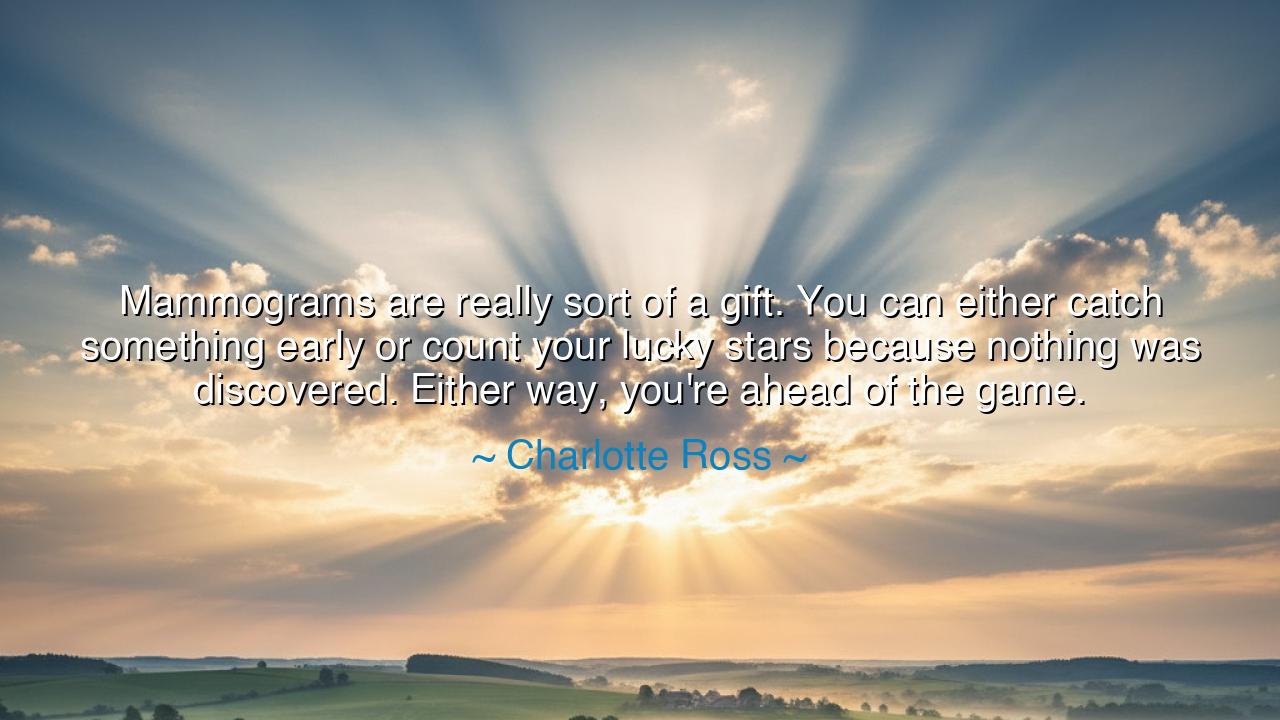
Mammograms are really sort of a gift. You can either catch
Mammograms are really sort of a gift. You can either catch something early or count your lucky stars because nothing was discovered. Either way, you're ahead of the game.






"Mammograms are really sort of a gift. You can either catch something early or count your lucky stars because nothing was discovered. Either way, you're ahead of the game." These words from Charlotte Ross carry with them an important reflection on the value of prevention, awareness, and the delicate balance between hope and certainty. The mammogram, a simple but powerful medical tool, offers women the chance to detect potential health issues—early detection can save lives, but even if nothing is found, it brings peace of mind. Ross emphasizes that the gift of the mammogram lies not just in the ability to find something early but in the gift of knowing, of empowering women to take charge of their health.
In the ancient world, the concept of prevention was often linked to divine wisdom and rituals that helped protect against illness. Hippocrates, the father of modern medicine, wrote that "prevention is better than cure", a belief that underscores much of what Ross suggests in her words. The Greeks understood that taking steps to maintain health and prevent disease was a critical aspect of well-being. For them, regular self-care and attention to the body’s signals were foundational to a long life. The early detection of any potential illness, they believed, was the key to living a full and prosperous life, a sentiment that echoes through the ages.
Similarly, in ancient Egypt, where medicine was both highly advanced and deeply intertwined with spirituality, regular rituals, practices, and observations were key to maintaining health. Priests and healers often practiced preventative care by offering treatments and remedies to ward off illness before it could take root. These ancient cultures did not have the technology we do today, but they understood the importance of early intervention—whether through herbal remedies or sacred rituals. The ancient Egyptians, like Ross, saw the value in being proactive about one’s health, understanding that prevention was just as important as treatment.
In the more recent past, the story of Marie Curie provides another powerful example of how detection and early intervention can be life-saving. Curie, a pioneer in the field of radiation, not only revolutionized medical treatments with her discovery of radium and polonium but also recognized the importance of early detection in the treatment of diseases like cancer. She promoted the idea of screening and preventative care long before it became commonplace. Curie’s work in the early 20th century laid the foundation for modern diagnostic methods, including the use of X-rays and other imaging technologies that today form the backbone of preventive care, including mammograms.
In a more contemporary context, mammograms are a symbol of the advances in medical technology that allow us to detect cancer at its earliest stages. The process is not always pleasant, but as Charlotte Ross highlights, the peace of mind it provides or the early detection it can facilitate is invaluable. The mammogram, a tool that can save lives by catching breast cancer before it spreads, represents a gift that modern medicine gives to women—a chance to take control of their health and intervene early. Ross reminds us that whether the result is nothing discovered or a potential health issue detected, the act of monitoring and caring for our health is always a step forward.
The lesson here is that prevention and awareness are key to health and longevity. Just as the ancients understood the value of early intervention, so must we recognize that modern medicine provides us with tools that empower us to take charge of our well-being. Mammograms, like many other forms of medical screening, are not just about diagnosis; they are about empowering women to take control over their health and make informed decisions about their bodies. They offer a chance for hope and certainty, for knowing that we have done all that we can to protect our health.
In our own lives, we must take responsibility for our health by seeking out preventative care, by making regular checkups a priority, and by listening to the signals our bodies give us. We must value early detection, not just as a tool for diagnosis, but as a gift—a chance to be ahead of the game. Just as the ancient healers understood the importance of staying attuned to our bodies, so too must we embrace the modern tools at our disposal, such as mammograms, to ensure that we are living our best, healthiest lives. The gift of health is something we must cherish and protect—by seeking out knowledge, taking action, and fostering an attitude of proactive care.






AAdministratorAdministrator
Welcome, honored guests. Please leave a comment, we will respond soon